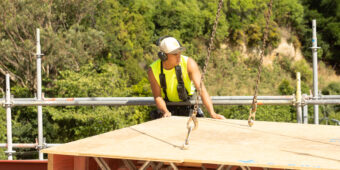When a small, detached dwelling is both simple and complex
05 Jun 2025, Building & Housing, Industry News, News

As New Zealand pushes forward with landmark changes to allow construction of small, detached dwellings without a consent, a recent determination from the Ministry of Business, Innovation and Employment (MBIE) shows that such buildings aren’t always simple
In April 2025, MBIE issued Determination 2025/022, reviewing Marlborough District Council’s decision to withhold a Code Compliance Certificate (CCC) for a 27-year-old detached, single-level, two-bedroom dwelling and garage, with an attached sleepout and bathroom clad in the same material. The property, located in Blenheim, had become the subject of scrutiny due to concerns around external moisture control and durability – key aspects of New Zealand’s Building Code.
The case centred on the building’s monolithic cladding system – a plaster-over-polystyrene installation – and how later modifications compromised its weather-tight performance. Sometime after the building work (except the garage sleepout) was completed in August 2001, concrete paths were laid directly against the cladding, which raised red flags about the building’s long-term resilience to moisture ingress (clause E2), as well as its durability (clause B2). A PVC strip drain, installed adjacent to the cladding, added further concern, as its compliance with moisture management standards was unclear.
When the owner applied for a CCC in 2023 (27 years post original construction), Marlborough District Council (the authority) carried out an inspection and noted that several items required action/rectification before a CCC could be issued for the dwelling, including the garage. The concerns were:
- The strip drain installed at the main entrance did not meet the functional requirements of clause E2.
- The state of the framing was a concern due to a lack of maintenance to the cladding and the concrete paths poured around the building.
The authority also said it would not issue a CCC until a qualified building surveyor had carried out an assessment of the garage and dwelling and supplied a written report.
Agree and disagree
Following a site visit and documentation review, MBIE agreed that while the council’s concerns were not unfounded, the rationale it provided for refusing the CCC lacked the detail and clarity required under section 95A of the Building Act.
Andrew Eames, MBIE Principal Advisor Determinations, found there were grounds to refuse the issue of a CCC – particularly regarding Building Code clause E2 and Clause B2.3 (50 years durability) regarding the performance of the timber frame structure behind the cladding.
However, the determination ultimately overturned the council’s decision due to deficiencies identified in the refusal notice.
“This new decision should take into account the findings of this determination and identify the missing information in a sufficiently specific and explicit way without directing one means of evidence (the surveyor’s report),” said Eames. In effect, the council can identify issues but not require a specific action.
Are granny flats always simple?
This decision comes amid a broader shift in how New Zealand approaches small-scale housing. In response to housing pressure, the Government has introduced legislation – set to take effect in 2026 – to make it easier to build small, secondary dwellings, or ‘granny flats’. Under the proposed rules, standalone dwellings up to 70m² will be exempt from building consents if they meet specific conditions. These include compliance with the Building Code, involvement of licensed building practitioners and notification to the local council.
This regulatory reform is designed to improve housing outcomes for New Zealanders. However, Determination 2025/022 illustrates how even simple dwellings can cause complications for homeowners.
Councils not liable, but could still investigate
Under the new regulatory system, any granny flat built under the exemption will still need to comply with the Building Code. However, Matthew McDermott, MBIE Manager Building Performance and Resilience Policy, told Under Construction that councils will not assess whether any proposed or completed exempt building work complies with the Building Code.
It will be up to the general public to raise suspected breaches of the Building Code with councils, he added.
McDermott said: “Should issues be brought to a council’s attention, it may decide to investigate and inspect these. This may include a charge. Councils retain their existing powers under the Building Act 2004 to address breaches of the Building Code.”
Councils will still have the power to issue Notices to Fix to address any work in breach of the Building Code, which homeowners and responsible parties are required to respond to, he continued.
“Councils may choose to carry out further inspections to check the breaches have been appropriately responded to. A failure to respond [to a Notice to Fix] is a breach under section 40 of the Building Act, attracting a fine of up to $200,000 and, in the case of a continuing offence, a further fine of up to $10,000 for every day the offence continues.”
Existing protections and recourse avenues remain
McDermott said existing avenues of recourse through determinations will still be available to members of the public, while MBIE can still review and investigate complaints on Building Consent Authorities (BCAs) failing to perform their statutory functions under the Building Act.
“In situations where BCAs or Territorial Authorities are unable or unwilling to prosecute offences, MBIE can prosecute.
“Existing protections under the Building Act 2004 will continue to apply for granny flats built under the exemption, including the 12-month defect repair period and the 10-year implied warranty period. These are well-established safeguards that ensure homeowners have recourse if problems arise,” he said.
“The Government is also strengthening occupational licensing, so homeowners can be confident in the quality and competency of builders working on granny flats. Homeowners can also choose to get a building consent for a consent-exempt granny flat for peace of mind or seek an engineer’s or builder’s report.”
Register to earn LBP Points Sign in



